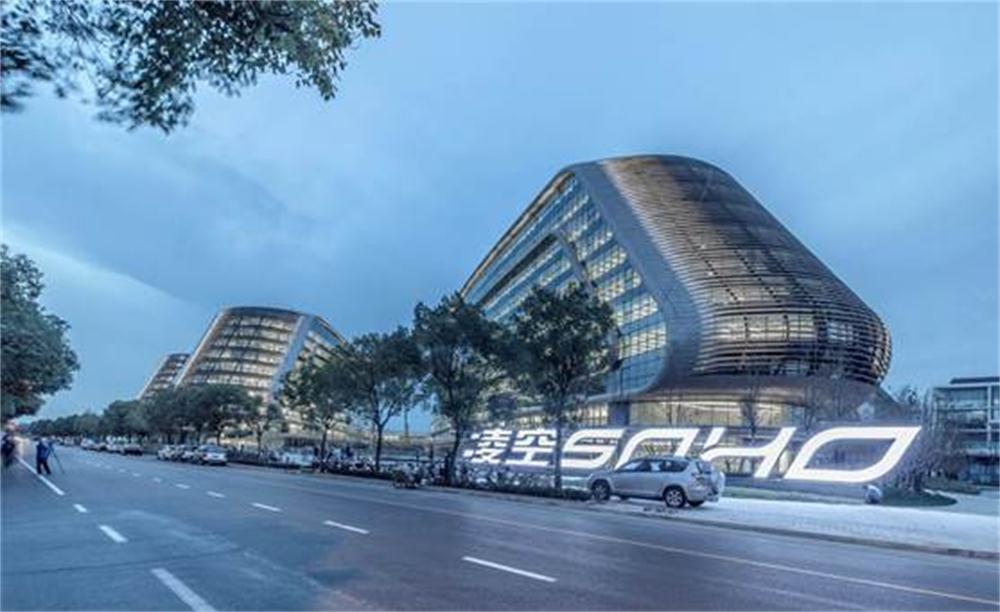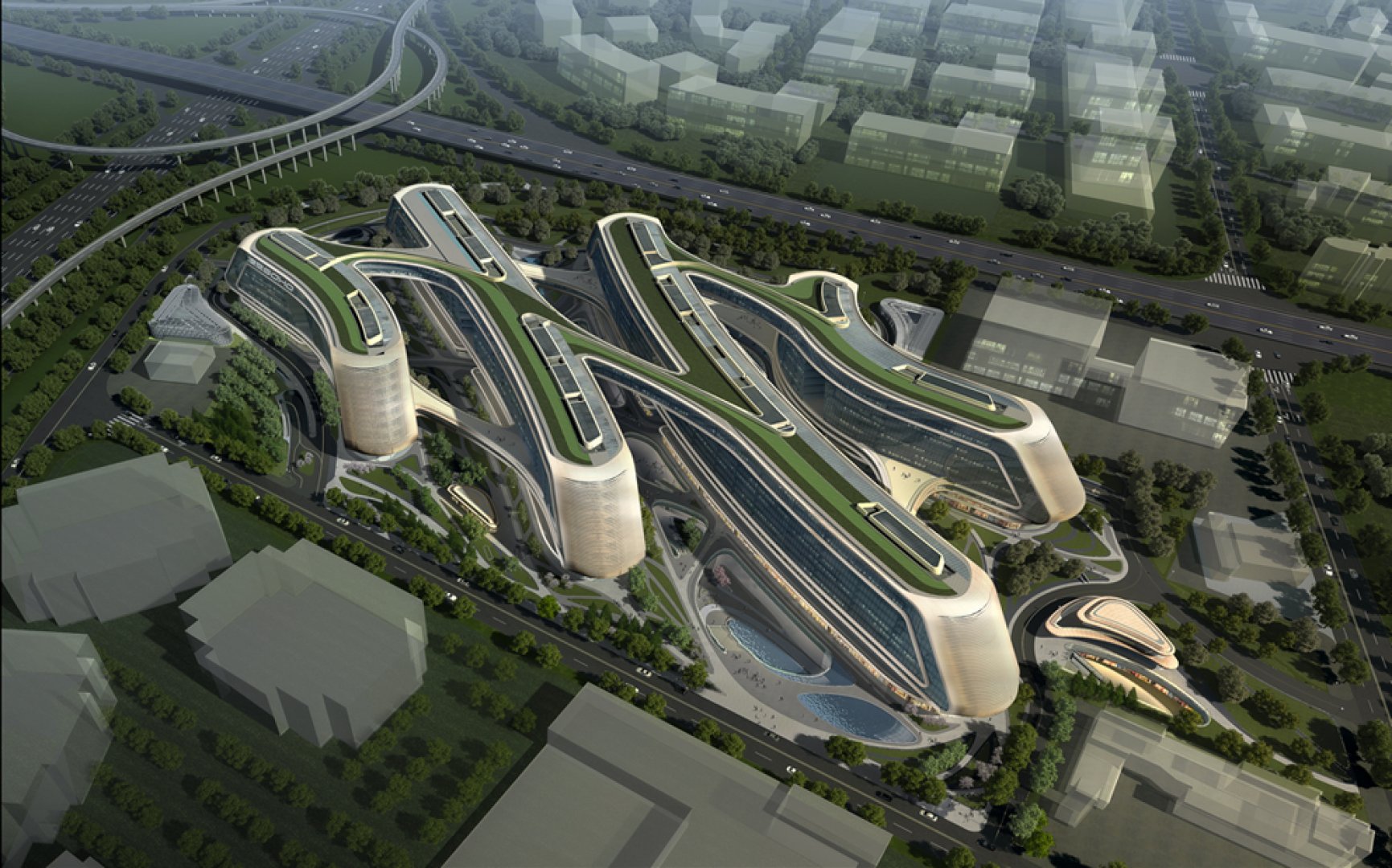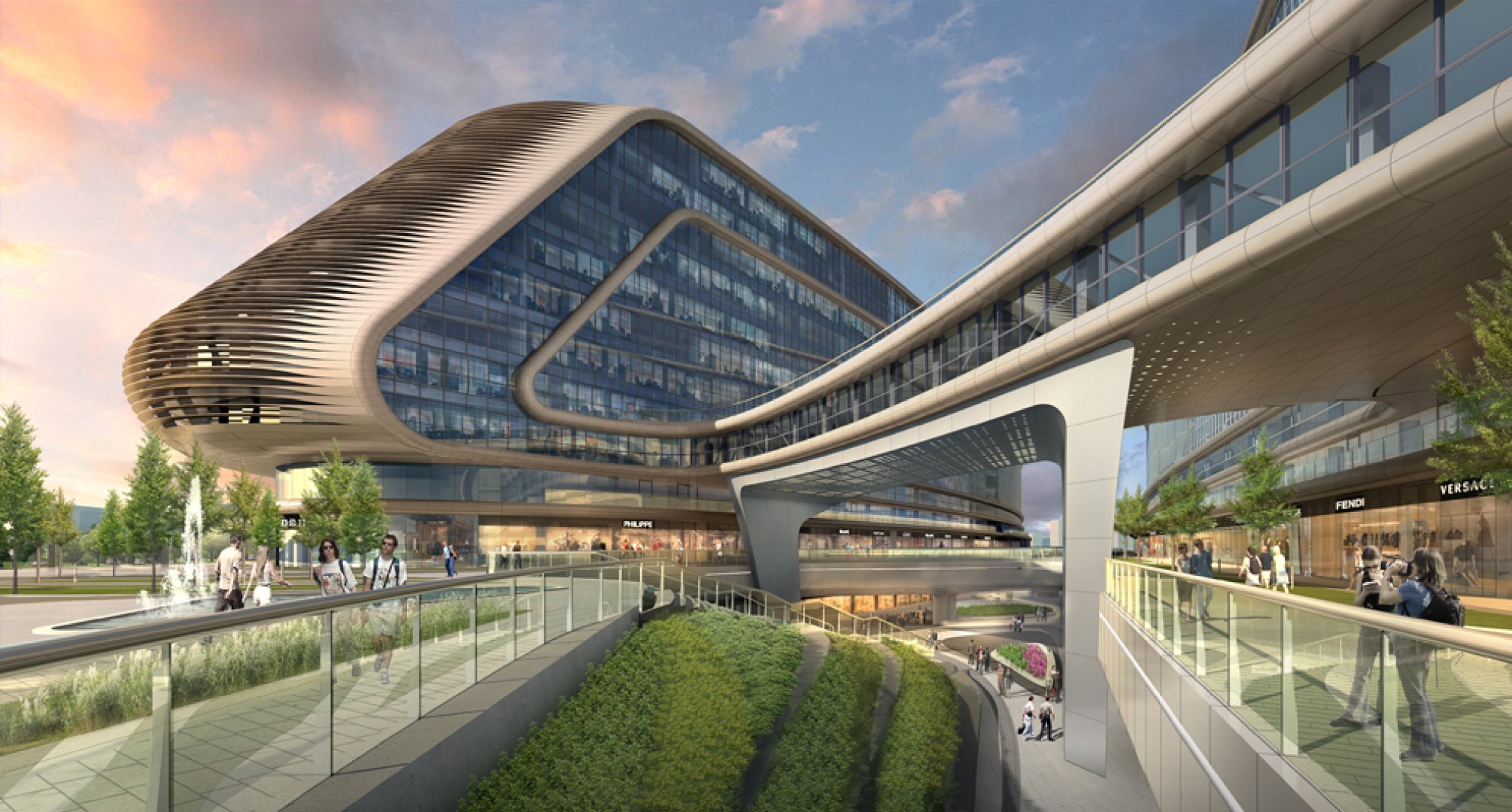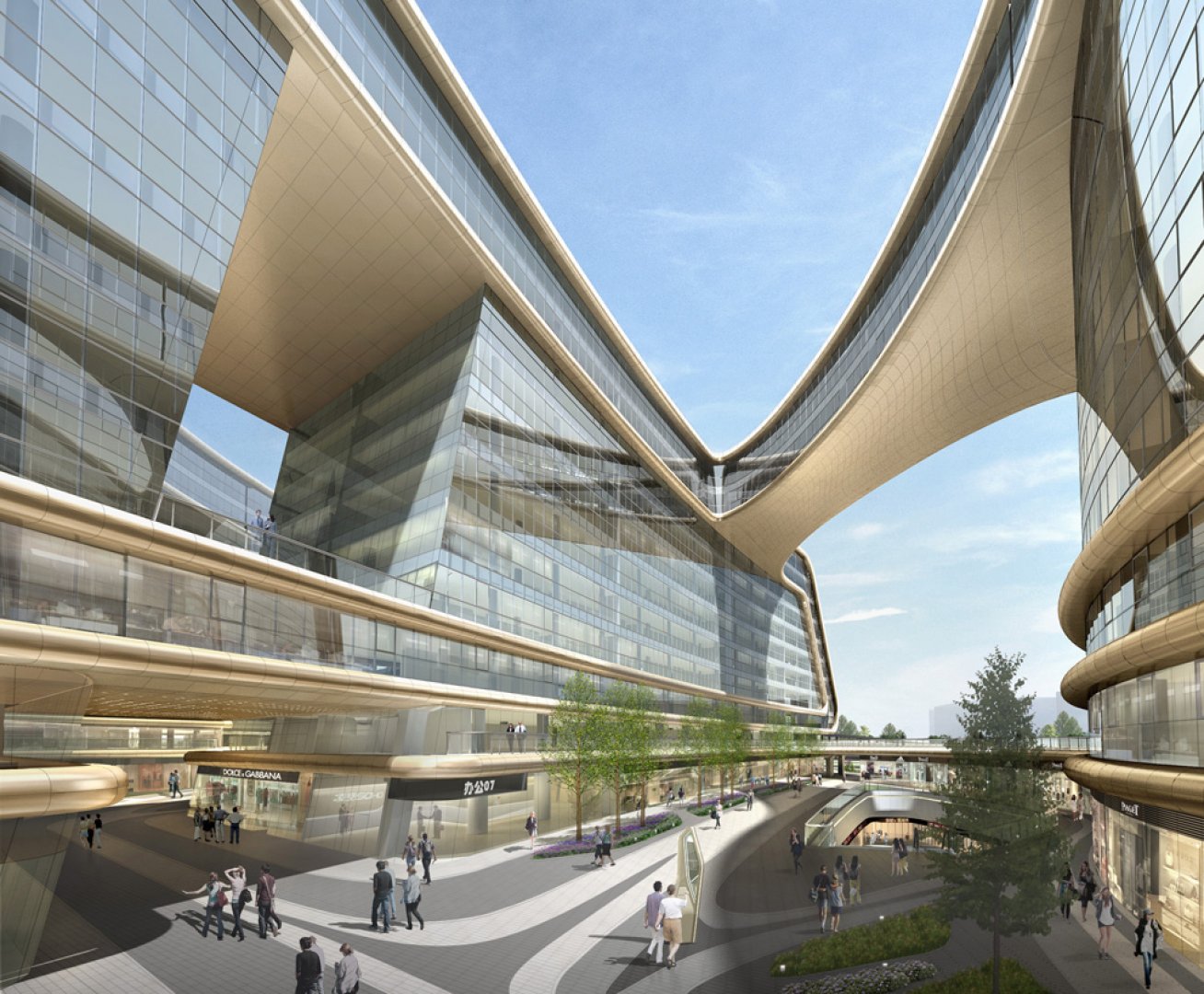Shanghai's newest landmark, Sky SOHO, debuted this week with a grand opening carnival celebration and light show attended by more than 10,000 spectators to witness the inauguration of the futuristic architecture.
Sky SOHO is Zaha Hadid's first work in Shanghai. Located on a lot of 86,000 sm and with a total GFA of 350,000 sm, Sky SOHO is comprised of 12 standalone buildings interlinked by 16 sky bridges. The buildings resemble four bullet trains about to take off.
Sky SOHO is the third in a trilogy of SOHO China developments designed by Zaha Hadid Architects, following Galaxy SOHO and Wangjing SOHO in Beijing.
Situated in the Shanghai Hongqiao Airport Economic Zone, Sky SOHO is adjacent to the Hongqiao transportation hub. The area is already home to the headquarters of over 800 companies, and has become established as an especially dense and active commercial zone in the Yangtze River Delta region. Boasting its spectacular design and advantageous location, Sky SOHO is Shanghai's new iconic landmark building.
Sky SOHO was designed to be a green, sustainable building with efficient energy use. So far, it has achieved LEED Gold precertification. To manage Shanghai's chronic air pollution and ensure high quality clean air indoors, Sky SOHO uses an advanced air purification system to effectively filter out over 90% of the atmospheric PM2.5, far exceeding the national standard.
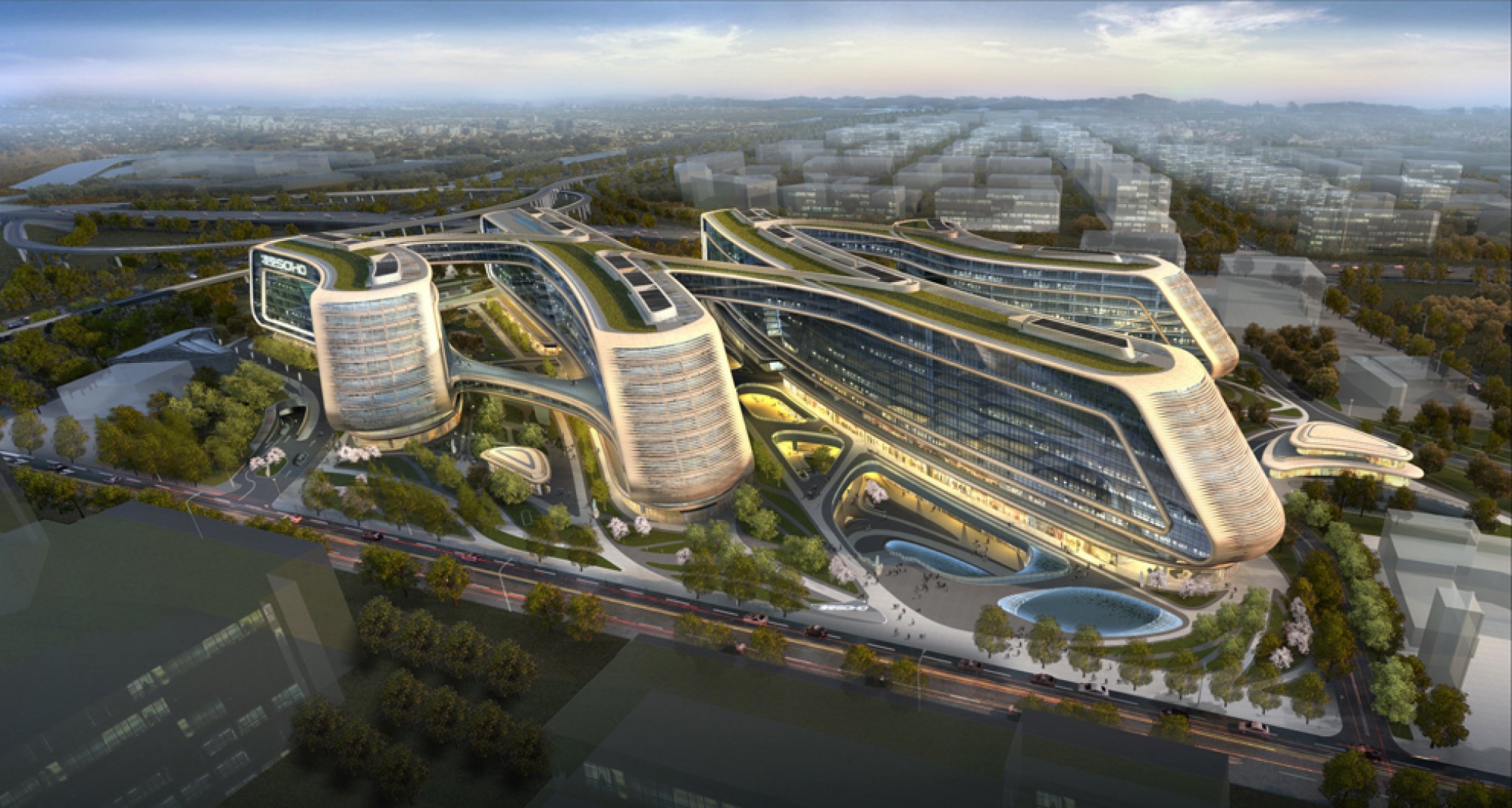
Renderings courtesy Zaha Hadid Architects
Sky SOHO is also equipped with a pure-drinking water five-layer filtration system that meets the water standards for aerospace facilities. Filtered water will be provided to all office kitchens above the second floor level.
This past September, SOHO China announced the sale of 100,167 sm of the Sky SOHO to Ctrip Travel Network Technology for its future office space development. Ctrip's presence is expected to invigorate the business environment, which will in turn facilitate the Sky SOHO leasing.
SOHO China Chairman Pan Shiyi comments, "After four years of arduous work, we have finally been able to transform the architect's blue prints into a new landmark for Shanghai. We thank every construction party for their tremendous efforts. We have always been very positive in our outlook on the Shanghai market, and will continue to strive to bring more iconic architectural works to this dynamic and cosmopolitan city."
Related Stories
Architects | May 2, 2024
Emerging considerations in inclusive design
Design elements that consider a diverse population of users make lives better. When it comes to wayfinding, some factors will remain consistent—including accessibility and legibility.
K-12 Schools | Apr 30, 2024
Fully electric Oregon elementary school aims for resilience with microgrid design
The River Grove Elementary School in Oregon was designed for net-zero carbon and resiliency to seismic events, storms, and wildfire. The roughly 82,000-sf school in a Portland suburb will feature a microgrid—a small-scale power grid that operates independently from the area’s electric grid.
AEC Tech | Apr 30, 2024
Lack of organizational readiness is biggest hurdle to artificial intelligence adoption
Managers of companies in the industrial sector, including construction, have bought the hype of artificial intelligence (AI) as a transformative technology, but their organizations are not ready to realize its promise, according to research from IFS, a global cloud enterprise software company. An IFS survey of 1,700 senior decision-makers found that 84% of executives anticipate massive organizational benefits from AI.
Codes and Standards | Apr 30, 2024
Updated document details methods of testing fenestration for exterior walls
The Fenestration and Glazing Industry Alliance (FGIA) updated a document serving a recommended practice for determining test methodology for laboratory and field testing of exterior wall systems. The document pertains to products covered by an AAMA standard such as curtain walls, storefronts, window walls, and sloped glazing. AAMA 501-24, Methods of Test for Exterior Walls was last updated in 2015.
MFPRO+ News | Apr 29, 2024
World’s largest 3D printer could create entire neighborhoods
The University of Maine recently unveiled the world’s largest 3D printer said to be able to create entire neighborhoods. The machine is four times larger than a preceding model that was first tested in 2019. The older model was used to create a 600 sf single-family home made of recyclable wood fiber and bio-resin materials.
K-12 Schools | Apr 29, 2024
Tomorrow's classrooms: Designing schools for the digital age
In a world where technology’s rapid pace has reshaped how we live, work, and communicate, it should be no surprise that it’s also changing the PreK-12 education landscape.
Adaptive Reuse | Apr 29, 2024
6 characteristics of a successful adaptive reuse conversion
In the continuous battle against housing shortages and the surplus of vacant buildings, developers are turning their attention to the viability of adaptive reuse for their properties.
AEC Innovators | Apr 26, 2024
National Institute of Building Sciences announces Building Innovation 2024 schedule
The National Institute of Building Sciences is hosting its annual Building Innovation conference, May 22-24 at the Capital Hilton in Washington, D.C. BI2024 brings together everyone who impacts the built environment: government agencies, contractors, the private sector, architects, scientists, and more.
Mass Timber | Apr 25, 2024
Bjarke Ingels Group designs a mass timber cube structure for the University of Kansas
Bjarke Ingels Group (BIG) and executive architect BNIM have unveiled their design for a new mass timber cube structure called the Makers’ KUbe for the University of Kansas School of Architecture & Design. A six-story, 50,000-sf building for learning and collaboration, the light-filled KUbe will house studio and teaching space, 3D-printing and robotic labs, and a ground-level cafe, all organized around a central core.
Sports and Recreational Facilities | Apr 25, 2024
How pools can positively affect communities
Clark Nexsen senior architects Jennifer Heintz and Dorothea Schulz discuss how pools can create jobs, break down barriers, and create opportunities within communities.


